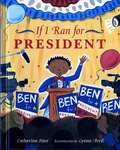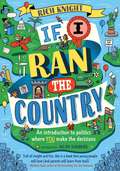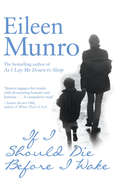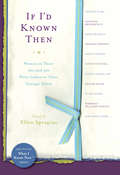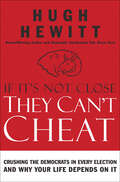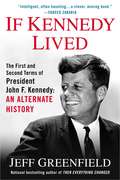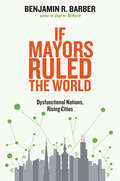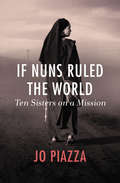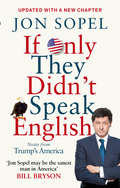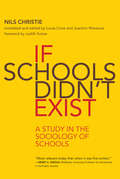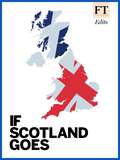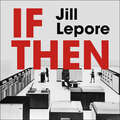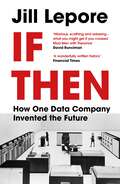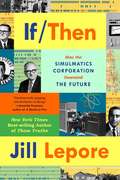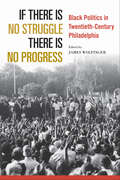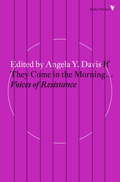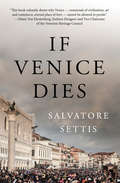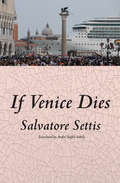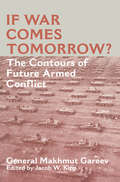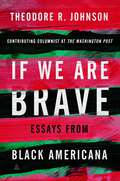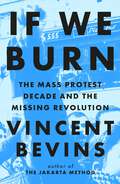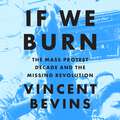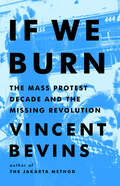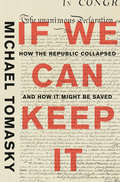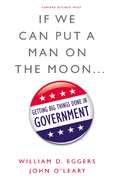- Table View
- List View
If I Ran For President
by Catherine Stier Lynne AvrilIf you ran for president, you would have to do a lot of hard work. You would study the nation's problems, tell the American people about your platform, select a running mate, and debate your opponents on live television.
If I Ran the Country: An introduction to politics where YOU make the decisions
by Rich Knight'The perfect book for our times ... that young people will love (and parents will learn from too!).' - Matthew SyedCongratulations! You've just become the leader of your own country! There are a lot of decisions to be made, and not long to make them.The good news is you've got your hands on this funny, fact-packed book, covering everything you need to know to rule effectively - no matter where in the world you are.But it's not just about political systems, elections, climate change, justice and all those other things we hear politicians talking about. You also need to learn how to lead. With essential life and leadership skills and tips - from teamwork, confidence and compassion to discovering who you are and what you believe in - If I Ran The Country answers all the questions most often posed by first-time top dogs like you. You'll be ruling like a pro in no time!
If I Should Die Before I Wake
by Eileen MunroIn her bestselling memoir As I Lay Me Down to Sleep, Eileen Munro vividly documented the abuse she experienced at the hands of her adoptive parents and, later, within the care system. The birth of Eileen's son, Craig, and her escape from the authorities' clutches should have seen her turn a corner, but she remains haunted by the spectre of her past.In If I Should Die Before I Wake, Eileen chronicles her search for her real parents and her battle for an education for both Craig and herself. She faces exploitation, suffers further sexual and physical abuse, and endures periods of homelessness and bad health. Still she perseveres, clinging to her hopes for the future, until she eventually finds the sense of belonging that has previously eluded her.In this harrowing but ultimately inspirational second volume of memoir, Eileen Munro proves that, against all the odds, happiness does sometimes come to those who never give up hope.
If I'd Known Then: Women in Their 20s and 30s Write Letters to Their Younger Selves
by Ellyn SpraginsNow in paperback, the popular second volume in the What I Know Now™ series offers wonderfully candid letters from women under forty, who give advice to the girls they once were. Readers will discover familiar names as well as new voices, including actress Jessica Alba; singer/songwriter Natasha Bedingfield; author Hope Edelman; Olympic soccer gold medalist Julie Foudy; singer/songwriter Lisa Loeb; and actress Kimberly Williams-Paisley. Here are stories of young love; of daring to chart a new path when everyone tells you to play it safe; of realizing that perfection is a pipe dream. The ideal gift for any young woman in your life, this collection provides "a boost of hope that today’s turmoil can foster tomorrow’s growth, success, and happiness” (Boston Globe).
If It's Not Close, They Can't Cheat: Crushing the Democrats in Every Election and Why Your Life Depends on It
by Hugh HewittThis is a book about winning elections in an age when security has trumped almost every other issue and the technology of political effectiveness is evolving with lightning quickness. Hewitt offers real-world tactics for individuals who (1) care about the future of the United States and (2) want to work effectively to help elect candidates who will lead the country-on a national or local level-in the right direction.In this book, Hugh Hewitt does more than rehash conservative grievances, preach to the choir, or even preach to the choir plus the undecideds. He aims to change the behavior of the choir, one reader at a time. Hewitt includes material targeted to people of faith when appropriate and appeals to all readers who consider themselves conservative or center-right. Material has been updated to cover current events in 2006.
If Kennedy Lived
by Jeff GreenfieldFrom one of the country’s most brilliant political commentators, the bestselling author of Then Everything Changed, an extraordinary, thought-provoking look at Kennedy’s presidency-after November 22, 1963. November 22, 1963: JFK does not die. What would happen to his life, his presidency, his country, his world? In Then Everything Changed, Jeff Greenfield created an "utterly compelling” (Joe Klein), "riveting” (The New York Times), "eye-opening” (Peggy Noonan), "captivating” (Doris Kearns Goodwin) exploration of three modern alternate histories, "with the kind of political insight and imagination only he possesses” (David Gregory). Based on memoirs, histories, oral histories, fresh reporting, and his own knowledge of the players, the book looked at the tiny hinges of history-and the extraordinary changes that would have resulted if they had gone another way. Now he presents his most compelling narrative of all about the historical event that has riveted us for fifty years. What if Kennedy were not killed that fateful day? What would the 1964 campaign have looked like? Would changes have been made to the ticket? How would Kennedy, in his second term, have approached Vietnam, civil rights, the Cold War? With Hoover as an enemy, would his indiscreet private life finally have become public? Would his health issues have become so severe as to literally cripple his presidency? And what small turns of fate in the days and years before Dallas might have kept him from ever reaching the White House in the first place? As with Then Everything Changed, the answers Greenfield provides and the scenarios he develops are startlingly realistic, rich in detail, shocking in their projections, but always deeply, remarkably plausible. It is a tour de force of American political history. .
If Mayors Ruled the World
by Benjamin R. BarberIn the face of the most perilous challenges of our time-climate change, terrorism, poverty, and trafficking of drugs, guns, and people-the nations of the world seem paralyzed. The problems are too big, too interdependent, too divisive for the nation-state. Is the nation-state, once democracy's best hope, today democratically dysfunctional? Obsolete? The answer, says Benjamin Barber in this highly provocative and original book, is yes. Cities and the mayors who run them can do and are doing a better job. Barber cites the unique qualities cities worldwide share: pragmatism, civic trust, participation, indifference to borders and sovereignty, and a democratic penchant for networking, creativity, innovation, and cooperation. He demonstrates how city mayors, singly and jointly, are responding to transnational problems more effectively than nation-states mired in ideological infighting and sovereign rivalries. Featuring profiles of a dozen mayors around the world-courageous, eccentric, or both at once-If Mayors Ruled the World presents a compelling new vision of governance for the coming century. Barber makes a persuasive case that the city is democracy's best hope in a globalizing world, and great mayors are already proving that this is so.
If Nuns Ruled the World: Ten Sisters on a Mission
by Jo Piazza&“Fascinating profiles&” of remarkable nuns, from an eighty-three-year-old Ironman champion to a crusader against human trafficking (Daily News [New York]). &“In an age of villainy, war and inequality, it makes sense that we need superheroes,&” writes Nicholas Kristof of The New York Times. &“And after trying Superman, Batman and Spider-Man, we may have found the best superheroes yet: Nuns.&” In If Nuns Ruled the World, veteran reporter Jo Piazza overthrows the popular perception of nuns as killjoy schoolmarms, instead revealing them as the most vigorous catalysts of change in an otherwise repressive society. Meet Sister Simone Campbell, who traversed the United States challenging a Congressional budget that threatened to severely undermine the well-being of poor Americans; Sister Megan Rice, who is willing to spend the rest of her life in prison if it helps eliminate nuclear weapons; and the inimitable Sister Jeannine Gramick, who is fighting for acceptance of gays and lesbians in the Catholic Church. During a time when American nuns are often under attack from the very institution to which they devote their lives—and the values of the institution itself are hotly debated—these sisters offer thought-provoking and inspiring stories. As the Daily Beast put it, &“Anybody looking to argue there is a place for Catholicism in the modern world should just stand on a street corner handing out Piazza&’s book.&”
If Only They Didn't Speak English: Notes From Trump's America
by Jon Sopel'You see, if only they didn’t speak English in America, then we’d treat it as a foreign country – and probably understand it a lot better’‘the sanest man in America’ – Bill Bryson‘Jon Sopel nails it’ – Emily Maitlis**With a brand new chapter, charting Trump's first year in power**As the BBC’s North America Editor, Jon Sopel has had a pretty busy time of it lately. In the time it’s taken for a reality star to go from laughing stock to leader of the free world, Jon has travelled the length and breadth of the United States, experiencing it from a perspective that most of us could only dream of: he has flown aboard Air Force One, interviewed President Obama and has even been described as ‘a beauty’ by none other than Donald Trump.Through music, film, literature, TV and even through the food we eat and the clothes that we wear we all have a highly developed sense of what America is and through our shared, tangled history we claim a special relationship. But America today feels about as alien a country as you could imagine. It is fearful, angry and impatient for change.In this fascinating, insightful portrait of American life and politics, Jon Sopel sets out to answer our questions about a country that once stood for the grandest of dreams, but which is now mired in a storm of political extremism, racial division and increasingly perverse beliefs.
If Schools Didn't Exist: A Study in the Sociology of Schools
by Nils ChristieA classic in the philosophy of education, considering the fundamental purpose and function of schools, translated into English for the first time.This classic 1971 work on the fundamental purpose and function of schools belongs on the same shelf as other landmark works of the era, including Ivan Illich's Deschooling Society, Paulo Freire's Pedagogy of the Oppressed, and John Holt's How Children Fail. Nils Christie's If School Didn't Exist, translated into English for the first time, departs from these works by not considering schooling (and deschooling) as much as schools and their specific community and social contexts. Christie argues that schools should be proving grounds for how to live together in society rather than assembly lines producing future citizens and employees.
If Scotland Goes
by VariousThe FT's latest ebook is a guide to what would happen if Scotland were to vote for independence in a referendum in September 2014. While the outcome is far from certain, a yes vote would have a profound effect not only on the 5.3m people of Scotland, but also on the economic future and fundamental character of the UK. We introduce Alex Salmond, the Scottish first minister and driving force behind the independence campaign. We examine the difficult economic issues, led by an independent Scotland's choice of currency, and the potential benefits independence would bring for example in a separate immigration policy. We include observations from an expatriate Scot that give a flavour of the personal and social backdrop to the constitutional choice. This collection of articles - a mixture of dispassionate reporting and trenchant comment and analysis - first published by the Financial Times between November 2013 and February 2014 is a must for anybody seeking a quick introduction to one of the biggest political events of the year.
If Then: How One Data Company Invented the Future
by Jill LeporeRadio 4's Book of the WeekA Financial Times Book of the YearShortlisted for the 2020 Financial Times / McKinsey Business Book of the YearLonglisted for the National Book Award 'The story of the original data science hucksters of the 1960s is hilarious, scathing and sobering - what you might get if you crossed Mad Men with Theranos' David RuncimanThe Simulmatics Corporation, founded in 1959, mined data, targeted voters, accelerated news, manipulated consumers, destabilized politics, and disordered knowledge--decades before Facebook, Google, Amazon, and Cambridge Analytica. Silicon Valley likes to imagine it has no past but the scientists of Simulmatics are the long-dead grandfathers of Mark Zuckerberg and Elon Musk. Borrowing from psychological warfare, they used computers to predict and direct human behavior, deploying their "People Machine" from New York, Cambridge, and Saigon for clients that included John Kennedy's presidential campaign, the New York Times, Young & Rubicam, and, during the Vietnam War, the Department of Defence. In If Then, distinguished Harvard historian and New Yorker staff writer, Jill Lepore, unearths from the archives the almost unbelievable story of this long-vanished corporation, and of the women hidden behind it. In the 1950s and 1960s, Lepore argues, Simulmatics invented the future by building the machine in which the world now finds itself trapped and tormented, algorithm by algorithm.'A person can't help but feel inspired by the riveting intelligence and joyful curiosity of Jill Lepore. Knowing that there is a mind like hers in the world is a hope-inducing thing' George Saunders, Man Booker Prize-winning author of Lincoln in the Bardo'An authoritative account of the origins of data science, a compelling political narrative of America in the Sixties, a poignant collective biography of a generation of flawed men' David Kynaston'If Then is simultaneously gripping and absolutely terrifying' Amanda Foreman
If Then: How One Data Company Invented the Future
by Jill LeporeRadio 4's Book of the WeekA Financial Times Book of the YearShortlisted for the 2020 Financial Times / McKinsey Business Book of the YearLonglisted for the National Book Award 'The story of the original data science hucksters of the 1960s is hilarious, scathing and sobering - what you might get if you crossed Mad Men with Theranos' David RuncimanThe Simulmatics Corporation, founded in 1959, mined data, targeted voters, accelerated news, manipulated consumers, destabilized politics, and disordered knowledge--decades before Facebook, Google, Amazon, and Cambridge Analytica. Silicon Valley likes to imagine it has no past but the scientists of Simulmatics are the long-dead grandfathers of Mark Zuckerberg and Elon Musk. Borrowing from psychological warfare, they used computers to predict and direct human behavior, deploying their "People Machine" from New York, Cambridge, and Saigon for clients that included John Kennedy's presidential campaign, the New York Times, Young & Rubicam, and, during the Vietnam War, the Department of Defence. In If Then, distinguished Harvard historian and New Yorker staff writer, Jill Lepore, unearths from the archives the almost unbelievable story of this long-vanished corporation, and of the women hidden behind it. In the 1950s and 1960s, Lepore argues, Simulmatics invented the future by building the machine in which the world now finds itself trapped and tormented, algorithm by algorithm.'A person can't help but feel inspired by the riveting intelligence and joyful curiosity of Jill Lepore. Knowing that there is a mind like hers in the world is a hope-inducing thing' George Saunders, Man Booker Prize-winning author of Lincoln in the Bardo'An authoritative account of the origins of data science, a compelling political narrative of America in the Sixties, a poignant collective biography of a generation of flawed men' David Kynaston'If Then is simultaneously gripping and absolutely terrifying' Amanda Foreman
If Then: How Simulmatics Corporation Invented The Future
by Jill LeporeLonglisted • Financial Times & McKinsey Business Book of the Year A revelatory account of the Cold War origins of the data-mad, algorithmic twenty-first century, from the author of the acclaimed international bestseller These Truths. The Simulmatics Corporation, launched during the Cold War, mined data, targeted voters, manipulated consumers, destabilized politics, and disordered knowledge—decades before Facebook, Google, and Cambridge Analytica. Jill Lepore, best-selling author of These Truths, came across the company’s papers in MIT’s archives and set out to tell this forgotten history, the long-lost backstory to the methods, and the arrogance, of Silicon Valley. Founded in 1959 by some of the nation’s leading social scientists—“the best and the brightest, fatally brilliant, Icaruses with wings of feathers and wax, flying to the sun”—Simulmatics proposed to predict and manipulate the future by way of the computer simulation of human behavior. In summers, with their wives and children in tow, the company’s scientists met on the beach in Long Island under a geodesic, honeycombed dome, where they built a “People Machine” that aimed to model everything from buying a dishwasher to counterinsurgency to casting a vote. Deploying their “People Machine” from New York, Washington, Cambridge, and even Saigon, Simulmatics’ clients included the John F. Kennedy presidential campaign, the New York Times, the Department of Defense, and dozens of major manufacturers: Simulmatics had a hand in everything from political races to the Vietnam War to the Johnson administration’s ill-fated attempt to predict race riots. The company’s collapse was almost as rapid as its ascent, a collapse that involved failed marriages, a suspicious death, and bankruptcy. Exposed for false claims, and even accused of war crimes, it closed its doors in 1970 and all but vanished. Until Lepore came across the records of its remains. The scientists of Simulmatics believed they had invented “the A-bomb of the social sciences.” They did not predict that it would take decades to detonate, like a long-buried grenade. But, in the early years of the twenty-first century, that bomb did detonate, creating a world in which corporations collect data and model behavior and target messages about the most ordinary of decisions, leaving people all over the world, long before the global pandemic, crushed by feelings of helplessness. This history has a past; If Then is its cautionary tale.
If There Is No Struggle There Is No Progress: Black Politics in Twentieth-Century Philadelphia
by James WolfingerPhiladelphia has long been a crucial site for the development of Black politics across the nation. If There Is No Struggle There Is No Progress provides an in-depth historical analysis—from the days of the Great Migration to the present—of the people and movements that made the city a center of political activism. The editor and contributors show how Black activists have long protested against police abuse, pushed for education reform, challenged job and housing discrimination, and put presidents in the White House. If There Is No Struggle There Is No Progress emphasizes the strength of political strategies such as the “Don’t Buy Where You Can’t Work” movement and the Double V campaign. It demonstrates how Black activism helped shift Philadelphia from the Republican machine to Democratic leaders in the 1950s and highlights the election of politicians like Robert N. C. Nix, Sr., the first African American representative from Philadelphia. In addition, it focuses on grassroots movements and the intersection of race, gender, class, and politics in the 1960s, and shows how African Americans from the 1970s to the present challenged Mayor Frank Rizzo and helped elect Mayors Wilson Goode, John Street, and Michael Nutter. If There Is No Struggle There Is No Progress cogently makes the case that Black activism has long been a powerful force in Philadelphia politics.
If They Come in the Morning...
by Angela Y. DavisWith race and the police once more burning issues, this classic work from one of America’s giants of black radicalism has lost none of its prescience or powerOne of America’s most historic political trials is undoubtedly that of Angela Davis. Opening with a letter from James Baldwin to Davis, and including contributions from numerous radicals such as Black Panthers George Jackson, Huey P. Newton, Bobby Seale and Erica Huggins, this book is not only an account of Davis’s incarceration and the struggles surrounding it, but also perhaps the most comprehensive and thorough analysis of the prison system of the United State. Since the book was written, the carceral system in the US has seen unprecedented growth, with more of America’s black population behind bars than ever before. The scathing analysis of the role of prison and the policing of black populations offered by Davis and her comrades in this astonishing volume remains as pertinent today as the day it was first published.Featuring contributions from George Jackson, Bettina Aptheker, Bobby Seale, James Baldwin, Ruchell Magee, Julian Bond, Huey P. Newton, Erika Huggins, Fleeta Drumgo, John Clutchette, and others.
If Venice Dies
by Salvatore SettisIn the tradition of Jane Jacobs’ The Death and Life of Great American Cities comes an urgent plea from internationally renowned art historian Salvatore Settis to preserve Venice’s future.What is Venice worth? To whom does this urban treasure belong? Venetians are increasingly abandoning their hometown — there’s now only one resident for every 140 visitors — and Venice’s fragile fate has become emblematic of the future of historic cities everywhere as it capitulates to tourists and those who profit from them. In If Venice Dies, a fiery blend of history and cultural analysis, internationally renowned art historian Savatore Settis argues that “hit-and-run” visitors are turning landmark urban settings into shopping malls and theme parks. He warns that Western civilization’s prime achievements face impending ruin from mass tourism and global cultural homogenization. This is a passionate plea to secure Venice’s future, written with consummate authority, wide-ranging erudition, and élan.
If Venice Dies
by Salvatore Settis&“This powerful book of cultural criticism&” by the renowned art historian &“shines a harsh light on&” a historic city&’s destruction in the name of profit (The Washington Post). What is Venice worth? To whom do its irreplaceable treasures belong? This eloquent book by art historian Salvatore Settis urgently poses these questions, igniting a new debate about urban stewardship and cultural patrimony at large. As Venice grows increasingly unaffordable and inhospitable to its own residents, Venetians are abandoning their hometown at an alarming rate. At last count, there was only one local for every 140 visitors. As it capitulates to tourists and those who profit from them, Venice&’s transformation into a lifeless shell of itself has become emblematic of the future of historic cities everywhere. In this blend of history and cultural analysis, written with wide-ranging erudition and élan, Settis makes a passionate plea to secure the soul of Venice. &“Anyone interested in learning what is really going on in Venice should read this book.&” —Donna Leon, author of My Venice and Other Essays and Death at La Fenice
If War Comes Tomorrow?: The Contours of Future Armed Conflict (Soviet (Russian) Military Theory and Practice #No. 7)
by General Makhmut GareevMilitary affairs have been affected by major changes in recent years. The bipolar world of two superpowers has gone. The Cold War and the global military confrontation that accompanied it have ended. A new military and political order has emerged in the world, but the world has not become more stable; indeed, wars and armed conflict have become much more common.Forecasting the contours of future armed conflict is no easy task at such times, but this is the primary objective of If War Comes Tomorrow? Focusing on the impact of new technologies, General Gareev considers whether war is still a continuation of politics by other means' or whether the political, ideological, and technical transformation have broken that connection. He explores the linkage between threats to Russian national interests and war as an instrument of policy in great detail and concludes that there is very little prospect either of nuclear war or widespread conventional war. However, he does see local armed conflicts and local wars increasing, with greater emphasis on subversion. He argues that coming decades will see a shift towards a reliance upon indirect means to accomplish limited political ends, and analyses both information warfare and the revolution in military affairs from this perspective.
If We Are Brave: Essays from Black Americana
by Theodore JohnsonThe popular Washington Post contributing opinion columnist challenges readers to have uncomfortable conversations about race, drawing on the first-person perspectives of the author and Americans from diverse viewpoints and walks of life.“The United States claims to be a nation founded on an idea,” writes Theodore R. Johnson, “but Americans—even though we nod our heads to that assertion—do not agree on what that idea is, what it should do, or who it is for.” The reality is that America is facing an existential quandary. Its citizens do not share a common vision for a democratic system in action, and even worse, do not share a common vision for what the country should be. We use the same words, but do not speak the same language.If We Are Brave is a keen-eyed and sobering examination of this rift and how race exposes and challenges traditional conceptions of national identity, national mythology, and American democracy. It is both a cultural exploration and a consideration of the American experiment through the eyes and experiences of Americans of different generations that cuts across race, ethnicity, gender, region, religion, and class. Johnson reveals the subtle ways that racialized conceptions of the American identity and the imperfect culture of democracy have hindered our ability to connect with one another, carefully piecing together first-person accounts ranging from a Rust Belt diner to the back of a police car to a jail cell.A beautiful but harsh indictment of a nation that aspires to be a more perfect union yet has consistently and painfully fallen short, If We Were Brave is a portrait of a nation at the precipice. It is an eye-opening, essential resource in a pivotal election year which will define America’s future, and a much-needed beacon of truth that sheds a bright light on who we are.
If We Burn: 'as good as journalism gets'
by Vincent BevinsThis book is phenomenal ... It's about as good as journalism gets ...The highest praise I can give If We Burn is to say that it would be criminally negligent not to read it if you'd like to change the world. - ROB DELANEY Bevins's clear-eyed, sympathetic account of the unfulfilled promise of these protests leaves his reader with a bold vision of the future. - MERVE EMREA stunning history of now. - GREG GRANDINFrom 2010 to 2020, more people took part in protests than at any other point in human history. Why has success been so elusive?From the so-called Arab Spring to Gezi Park in Turkey, from Ukraine's Euromaidan to student rebellions in Chile and Hong Kong, the second decade of the twenty-first century was propelled by explosive mass demonstrations. But few people got what they wanted. In too many cases, the protests led to the opposite of what they asked for.If We Burn is a stirring work of global history built around that strange but fundamental paradox. Acclaimed journalist Vincent Bevins interviewed hundreds of people around the world, and weaves their insights and recollections into a fast-paced, gripping narrative. We follow his own troubling experiences in Brazil, where a protest movement ignited by leftists and anarchists led to an extreme-right government that torched the Amazon.In the mass protest decade, humanity demonstrated a deep desire for change, and brave individuals started something that has been left unfinished. In this ground-breaking study of an extraordinary chain of events, protesters and major actors offer urgent lessons for those who wish to understand geopolitics today, and create a better world tomorrow.
If We Burn: 'as good as journalism gets' - Rob Delaney
by Vincent BevinsFrom 2010 to 2020, more people took part in protests than at any other point in human history. Why has success been so elusive?From the so-called Arab Spring to Gezi Park in Turkey, from Ukraine's Euromaidan to student rebellions in Chile and Hong Kong, the second decade of the twenty-first century was propelled by explosive mass demonstrations. But few people got what they wanted. In too many cases, the protests led to the opposite of what they asked for.If We Burn is a stirring work of global history built around that strange but fundamental paradox. Acclaimed journalist Vincent Bevins interviewed hundreds of people around the world, and weaves their insights and recollections into a fast-paced, gripping narrative. We follow his own troubling experiences in Brazil, where a protest movement ignited by leftists and anarchists led to an extreme-right government that torched the Amazon.In the mass protest decade, humanity demonstrated a deep desire for change, and brave individuals started something that has been left unfinished. In this ground-breaking study of an extraordinary chain of events, protesters and major actors offer urgent lessons for those who wish to understand geopolitics today, and create a better world tomorrow.(P) 2023 Hachette Book Group
If We Burn: The Mass Protest Decade and the Missing Revolution
by Vincent BevinsThe story of the recent uprisings that sought to change the world - and what comes next From 2010 to 2020, more people participated in protests than at any other point in human history. Yet we are not living in more just and democratic societies as a result. IF WE BURN is a stirring work of history built around a single, vital question: How did so many mass protests lead to the opposite of what they asked for? From the so-called Arab Spring to Gezi Park in Turkey, from Ukraine&’s Euromaidan to student rebellions in Chile and Hong Kong, acclaimed journalist Vincent Bevins provides a blow-by-blow account of street movements and their consequences, recounted in gripping detail. He draws on four years of research and hundreds of interviews conducted around the world, as well as his own strange experiences in Brazil, where a progressive-led protest explosion led to an extreme-right government that torched the Amazon. Careful investigation reveals that conventional wisdom on revolutionary change is gravely misguided. In this groundbreaking study of an extraordinary chain of events, protesters and major actors look back on successes and defeats, offering urgent lessons for the future.
If We Can Keep It: A Brief, 300-year History Of The Fall Of The Republic
by Michael TomaskyA game-changing account of the deep roots of political polarization in America, including an audacious fourteen-point agenda for how to fix it. Why has American politics fallen into such a state of horrible dysfunction? Can it ever be fixed? These are the questions that motivate Michael Tomasky’s deeply original examination into the origins of our hopelessly polarized nation. “One of America’s finest political commentators” (Michael J. Sandel), Tomasky ranges across centuries and disciplines to show how America has almost always had two dominant parties that are existentially, and often violently, opposed. When he turns to our current era, he does so with striking insight that will challenge readers to reexamine what they thought they knew. Finally, not content merely to diagnose these problems, Tomasky offers a provocative agenda for how we can help fix our broken political system—from ranked-choice voting and at-large congressional elections to expanding high school civics education nationwide. Combining revelatory data with trenchant analysis, Tomasky tells us how the nation broke apart and points us toward a more hopeful political future.
If We Can Put a Man on the Moon
by William D. Eggers John O'LearyThe American people are frustrated with their government-dismayed by a series of high-profile failures (Iraq, Katrina, the financial meltdown) that seems to just keep getting longer. Yet our nation has a proud history of great achievements: victory in World War II, our national highway system, welfare reform, the moon landing.We need more successes like these to reclaim government's legacy of competence. In If We Can Put a Man on the Moon, William Eggers and John O'Leary explain how to do it. The key? Understand-and avoid-the common pitfalls that trip up public-sector leaders during the journey from idea to results.The authors identify pitfalls including:-The Partial Map Trap: Fumbling handoffs throughout project execution-The Tolstoy Syndrome: Seeing only the possibilities you want to see-Design-Free Design: Designing policies for passage through the legislature, not for implementation-The Overconfidence Trap: Creating unrealistic budgets and timelines-The Complacency Trap: Failing to recognize that a program needs changeAt a time of unprecedented challenges, this book, with its abundant examples and hands-on advice, is the essential guide to making our government work better. A must-read for every public official, this book will be of interest to anyone who cares about the future of democracy.
